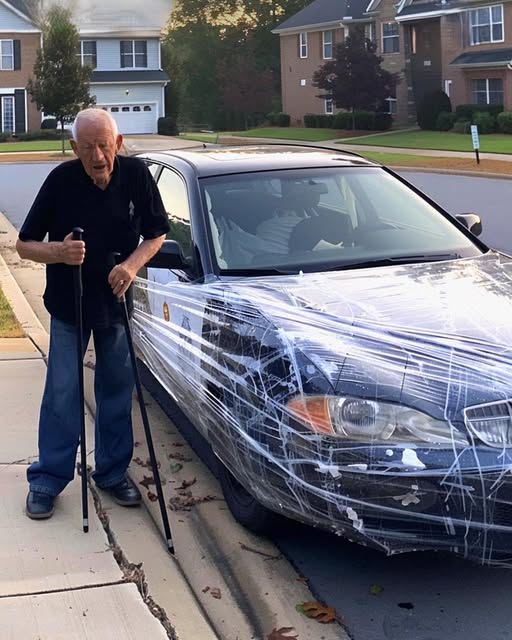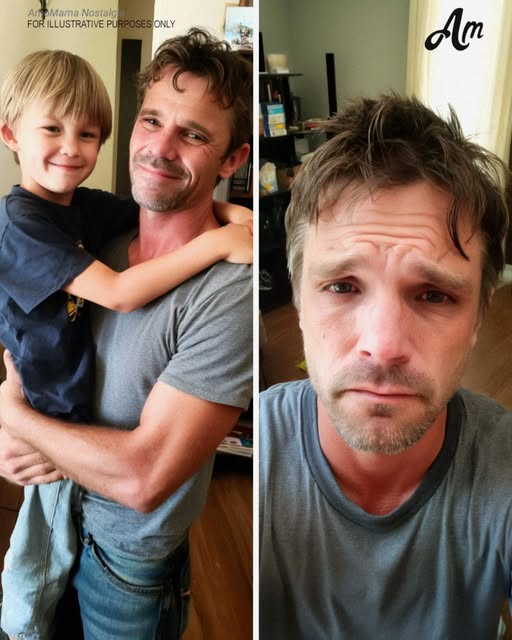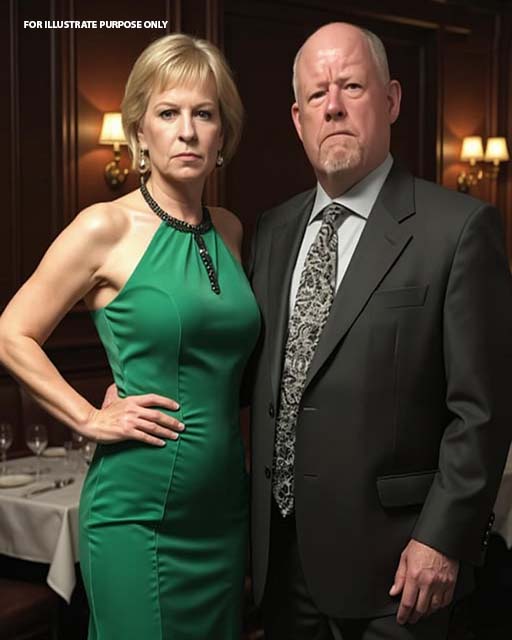I’ve lived on Mulberry Court long enough to know who shovels the shared sidewalk and who pretends the snow is a rumor. Long enough to remember the sound my late wife’s laugh made in the kitchen, and the way my grandson, Harry, used to stamp his little boot prints all the way to the mailboxes. These days it’s just me and the cane the doctor insists I use, a quiet house, and a parking space that lets me shave thirty painful steps off the trip to my front door.
That space is clearly marked. Has been for years. Which is why the first morning I found a mud-splattered pickup squatting in it like a bullfrog, I took a breath, rolled my shoulders, and knocked on the new neighbor’s door with my nicest knuckles.
He answered with a grin that didn’t shake my hand so much as catalog me. Mid-forties, buzz cut, biceps flexing under a vintage band tee. “Yeah?”
“Welcome to the neighborhood,” I said. “Friendly heads-up—that spot you’re in is mine. I’ve got a bad leg. Signs are a bit faded, but you can still make them out.”
He looked past me at the space, then back at me. “Didn’t see your name on it,” he said, and shut the door.
I let it go. Everyone has a first day. But the second day? Same truck. Same spot. Day three brought his son, a cocky kid in his early twenties with a vape and a smirk, and a second car nosed in as if claiming more land. I knocked again. I asked again. I even mentioned the cane. The father—Jack—rolled his eyes and moved the truck as if doing me a favor. The son—Drew—stood on the porch and watched like it was entertainment.
The following morning, I stepped outside with my coffee and my good mood and walked straight into petty war.
My sedan had been mummified. Transparent packing tape circled it from bumper to bumper, around the mirrors, under the wipers, through the wheel wells. A hundred tight loops that caught the sunlight and the breath in my throat. Someone had taken their time.
“Real mature,” I said to the empty street, which answered with a crow’s laugh and nothing else.
I took pictures from every angle—license plates, my “Reserved” stencil on the curb, a faint shadow of Drew’s sneaker scuffs near my bumper. Then I fetched a box cutter and started the long, sticky work of getting my life free.
By the time the last coil fell, my hands were shaking for more reasons than one. I dialed a number I know better than my own: Kelly down the block. She’s raising her two grandsons, Noah and Kris—good boys who mow my lawn without being asked and pretend to like my overcooked hot dogs on the Fourth of July.
“Greg?” she answered. “You sound winded.”
“New neighbor trouble,” I said. “Got a minute?”
She had three. Ten minutes later the boys were on my porch, eyes bright with the kind of curiosity that begs for a mission.
“We’re not slashing tires, are we?” Noah asked, half joking, half hopeful.
“We’re not breaking the law,” I said. “We’re… redecorating.”
On my way home from work, I took the scenic route past a party store and a garden center. I came back with two sacks of biodegradable glitter, a flock’s worth of pink plastic flamingos, and a dozen wind chimes that cost a dollar each and sounded exactly like a drawer of cutlery committing mutiny.
We waited until dark. The boys moved like cats; I moved like a man who once was a cat. Noah cast glitter in slow, theatrical arcs that settled into Jack’s grass and mulch and welcome mat like stars. Kris placed flamingos with the geometry of a mastermind, each one angled perfectly toward the front door as if awaiting orders. I hung wind chimes under eaves, from porch hooks, in the low branches of the maple; the breeze puffed its cheeks and our cheap orchestra obliged with a relentless ding-dong-chaos that would drive a saint to the brink.
We stood at the curb when we’d finished, hands on hips, trying not to howl. “Harmless,” I reminded them. “Annoying as sin, but harmless.”
“Better than tape,” Kris said.
“Better than a ticket,” Noah added.
“Who says there won’t be a ticket?” I said, tapping my phone. The photos I’d taken of my car, plus one more from a neighbor’s doorbell camera—Jack and Drew giggling like raccoons as they wrapped my sedan—had already made their way to the non-emergency line. “Some lessons arrive on the wind. Some arrive at your door with a badge.”
At seven the next morning, my coffee tasted like victory even before the door slam next door. “What the—” Jack bellowed. The chimes answered him. I peeked through the curtain in time to see him step into his front yard, stop dead, and blink at the glitter like it was a galaxy that had landed by mistake. Drew arrived a beat later, hair sticking up, bare feet slapping the glittered concrete. The flamingos stared them down, implacable.
I took my sweet time opening my door. “Morning,” I called, cheerful as a songbird. “Quite a… festive look.”
“You did this?” Jack snarled.
“Can’t imagine what you mean,” I said. “But if I were you, I’d focus on your porch. Looks sticky.”
Jack stepped forward, and three wind chimes tattled loudly. He glared at them like he could fire them. Before he could decide whether to tear one down, a cruiser nosed into the cul-de-sac. Two officers got out, the younger one scanning, the older one already looking tired of it all.
“Mr. Patterson?” the older officer asked.
Jack’s bravado didn’t so much deflate as leak. “Yeah?”
“We need to talk about a vandalism complaint,” the officer said. “And the repeated misuse of a designated accessibility space.”
“Vanda— Are you kidding me? Look at my yard!”
The officer didn’t. He held up printed photos in a clear sleeve—my taped car, Jack’s truck tucked where mine should have been, Drew mid-cackle with a spool of tape in his hand. “We’ll take your statement. You’ll also both need to come down to the station.”
Drew opened his mouth. Closed it. The chimes did the talking. The flamingos offered moral support.
It wasn’t a perp walk; it was a reality check with seat belts. They were back by noon, chastened, lighter in the wallet, and suddenly very interested in property lines. No one parked in my space again. The wind chimes, once unseated, found new life on my porch where they sound like spoons on a summer afternoon. The glitter lingered for weeks, a stubborn constellation that migrated into Jack’s carpet and probably his socks, a reminder under every step.
That afternoon, Kelly brought lemonade and too many cookies. The boys sprawled on my rug and rehashed the operation with the gusto of veterans. “The look on his face,” Kris said, miming Jack’s expression. Noah wiped tears, laughing.
“You’re a menace,” Kelly told me, kissing my cheek. “And I adore you.”
“I prefer ‘problem solver,’” I said. “But I’ll allow menace.”
A few weeks later, Harry came home for the holidays. He’d grown another inch and brought a duffel bag full of laundry and a hug that caught me under the ribs. The house smelled like evergreen and cinnamon and the musty comfort of boxes we only open once a year.
“So what’s this saga about a crime scene next door?” he asked over cocoa, eyes bright.
I told it. Everyone added their favorite detail—Noah’s slow-motion glitter toss, Kris’s flamingo choreography, Kelly’s impression of the wind chimes declaring war. Harry laughed so hard he had to set his mug down. “Grandpa,” he said, wiping his eyes, “you’re a legend.”
“Don’t encourage him,” Kelly said, but she was smiling.
Word travels on streets like ours. The story of the Great Flamingo Uprising went farther than I expected; somewhere between my front step and the third retelling, Jack decided he’d prefer a neighborhood with fewer wind instruments and left. A For Sale sign appeared and then disappeared. The new people wave when they pass. They shovel the sidewalk without being asked. They park in their own driveway.
In the end it wasn’t about humiliating anyone—though I won’t pretend the glitter didn’t satisfy something sharp in me. It was about drawing a line without losing myself on the wrong side of it. About accepting help from a couple of kids who needed a mission and reminding a bully that the smallest laws are still laws. About filling a quiet house with the right kind of noise: wind chimes on a breezy day, boys laughing in my living room, my grandson’s “You did what?” ringing off the picture frames.
I still miss Margaret most at dusk, when the sky goes the honest color and the street lights blink awake one by one. I still talk to her sometimes, tell her about the flamingos and the way the glitter stuck in the cracks where the ants used to pour out in June. I tell her I’m doing alright. The space out front stays open for me. The steps are still thirty fewer. The neighborhood buzzes, but in the good way now—the way a hive does when nothing is wrong and everyone is exactly where they belong.




